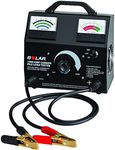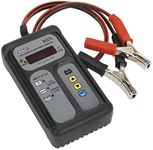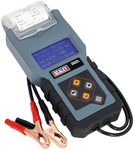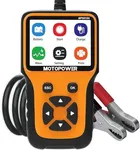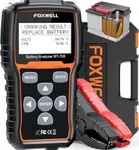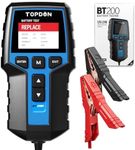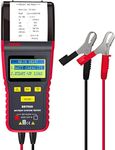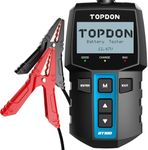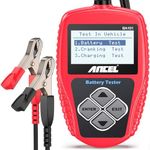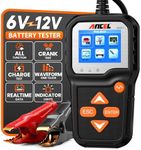Buying Guide for the Best Car Battery Testers
Choosing the right car battery tester is essential for maintaining your vehicle's battery health and ensuring it performs optimally. A car battery tester helps you diagnose the condition of your battery, preventing unexpected breakdowns and extending the battery's lifespan. When selecting a car battery tester, consider the following key specifications to find the best fit for your needs.Type of TesterCar battery testers come in different types, including digital, analog, and load testers. Digital testers provide precise readings and are user-friendly, making them ideal for most users. Analog testers are less common but can be useful for those who prefer a more traditional approach. Load testers apply a load to the battery to measure its performance under stress, which is useful for more in-depth diagnostics. Choose a digital tester for ease of use, an analog tester if you prefer simplicity, or a load tester if you need detailed analysis.
Voltage RangeThe voltage range of a car battery tester indicates the range of battery voltages it can measure. Most car batteries are 12V, but some vehicles, like trucks or motorcycles, may have different voltage requirements. Ensure the tester you choose can handle the voltage of your vehicle's battery. For standard cars, a tester with a 12V range is sufficient. If you have multiple vehicles with different battery voltages, opt for a tester with a broader voltage range.
Display TypeThe display type on a car battery tester can be either digital or analog. Digital displays are easier to read and often provide more detailed information, such as voltage, charge level, and battery health. Analog displays use a needle to indicate readings, which can be harder to interpret but are still effective. If you prefer clear, precise readings, go for a digital display. If you are comfortable with interpreting needle movements, an analog display can work just as well.
Testing CapabilitiesDifferent car battery testers offer various testing capabilities, such as checking voltage, cold cranking amps (CCA), and overall battery health. Some advanced models can also test the alternator and starter. Basic testers usually measure voltage and charge level, which is sufficient for routine checks. If you want a comprehensive analysis of your battery's condition, choose a tester with additional testing capabilities like CCA and alternator testing.
Ease of UseEase of use is an important factor, especially if you are not very experienced with car maintenance. Look for a tester with clear instructions, simple controls, and an easy-to-read display. Some testers come with features like automatic testing and guided prompts, which can make the process more straightforward. If you are a beginner, prioritize a user-friendly tester to ensure you can effectively monitor your battery's health without confusion.
PortabilityPortability refers to the size and weight of the car battery tester. A compact and lightweight tester is easier to store in your vehicle and more convenient to use on the go. If you need a tester that you can carry with you or store in a small space, opt for a portable model. However, if you plan to use the tester primarily at home or in a garage, portability may be less of a concern.
DurabilityDurability is crucial for a tool that may be used in various environments, including outdoors and in different weather conditions. Look for a tester with a sturdy build, preferably with a protective casing to withstand drops and impacts. Water and dust resistance can also be beneficial. If you expect to use the tester frequently or in harsh conditions, prioritize a durable model to ensure it lasts longer and remains reliable.



